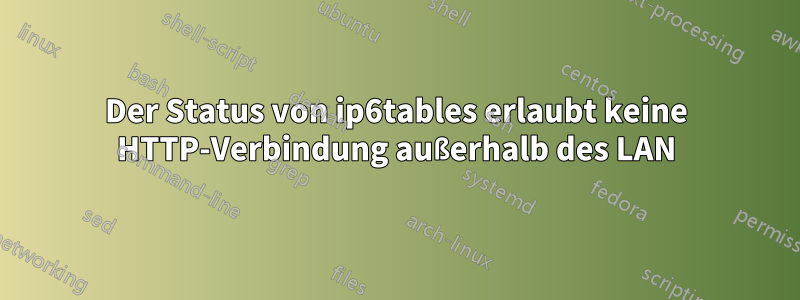
Ich habe eine Debian 11-Maschine, die als Router (Maschine A) für IPv6 mit WAN- (Bond0) und LAN-Schnittstelle (Bond1) fungiert, und eine weitere Debian 11-Maschine (Maschine B), die an ihre LAN-Schnittstelle angeschlossen ist. Dieses Setup funktioniert wie erwartet, bis ich die Firewall-Regeln in Maschine A einrichte:
ip6tables -A FORWARD -m state --state NEW,ESTABLISHED,RELATED -j ACCEPT
ip6tables -A FORWARD -p ipv6-icmp -j ACCEPT
ip6tables -P FORWARD DROP
Nach dieser Einrichtung funktioniert von Maschine B aus der Ping, sonst aber nichts. Bei einer HTTP-Verbindung funktioniert das beispielsweise nicht:
--2022-11-20 18:25:05-- http://[2a02:16a8:dc41:100::132]/
Connecting to [2a02:16a8:dc41:100::132]:80... connected.
HTTP request sent, awaiting response...
Sobald ich die Standardrichtlinie wieder auf Akzeptieren ändere:
ip6tables -P FORWARD ACCEPT
alles funktioniert wieder, die erwähnte Verbindung auch. Ich vermute also, dass der Fehler nicht an der Netzwerkkonfiguration liegt, sondern vielleicht an einer fehlenden Firewall-Regel. Die Standardrichtlinie für Ein- und Ausgabe lautet „Akzeptieren ohne Regel“ auf Maschine A:
Chain INPUT (policy ACCEPT 52117 packets, 7950K bytes)
pkts bytes target prot opt in out source destination
Chain FORWARD (policy DROP 0 packets, 0 bytes)
pkts bytes target prot opt in out source destination
0 0 ACCEPT all * * ::/0 ::/0 state NEW,RELATED,ESTABLISHED
0 0 ACCEPT icmpv6 * * ::/0 ::/0
Chain OUTPUT (policy ACCEPT 32646 packets, 2259K bytes)
pkts bytes target prot opt in out source destination
also nehme ich an, dass es in diesem Bereich kein Problem gibt. Für Maschine B sind keine Regeln festgelegt. Was fehlt mir, damit es funktioniert?
AKTUALISIEREN:
Nach dem Anhängen der Firewall-Regel ip6tables -A FORWARD -j LOGan das Ende der Filterregeln erhalte ich diese Meldungen in/var/log/kern.log
Nov 20 19:08:11 machineA kernel: [64351.126036] IN=bond1 OUT=bond0 MAC=<mac snip> SRC=<machine B ipv6> DST=<destination servers ipv6> LEN=72 TC=0 HOPLIMIT=63 FLOWLBL=735930 PROTO=TCP SPT=46848 DPT=80 WINDOW=507 RES=0x00 ACK URGP=0
Nov 20 19:08:11 machineA kernel: [64351.126186] IN=bond1 OUT=bond0 MAC=<mac snip> SRC=<machine B ipv6> DST=<destination servers ipv6> LEN=210 TC=0 HOPLIMIT=63 FLOWLBL=735930 PROTO=TCP SPT=46848 DPT=80 WINDOW=507 RES=0x00 ACK PSH URGP=0
Nov 20 19:08:11 machineA kernel: [64351.343310] IN=bond1 OUT=bond0 MAC=<mac snip> SRC=<machine B ipv6> DST=<destination servers ipv6> LEN=210 TC=0 HOPLIMIT=63 FLOWLBL=735930 PROTO=TCP SPT=46848 DPT=80 WINDOW=507 RES=0x00 ACK PSH URGP=0
Nov 20 19:08:11 machineA kernel: [64351.563328] IN=bond1 OUT=bond0 MAC=<mac snip> SRC=<machine B ipv6> DST=<destination servers ipv6> LEN=210 TC=0 HOPLIMIT=63 FLOWLBL=918248 PROTO=TCP SPT=46848 DPT=80 WINDOW=507 RES=0x00 ACK PSH URGP=0
Nov 20 19:08:12 machineA kernel: [64352.007316] IN=bond1 OUT=bond0 MAC=<mac snip> SRC=<machine B ipv6> DST=<destination servers ipv6> LEN=210 TC=0 HOPLIMIT=63 FLOWLBL=983152 PROTO=TCP SPT=46848 DPT=80 WINDOW=507 RES=0x00 ACK PSH URGP=0
Nov 20 19:08:12 machineA kernel: [64352.139854] IN=bond1 OUT=bond0 MAC=<mac snip> SRC=<machine B ipv6> DST=<destination servers ipv6> LEN=72 TC=0 HOPLIMIT=63 FLOWLBL=983152 PROTO=TCP SPT=46848 DPT=80 WINDOW=507 RES=0x00 ACK URGP=0
Nov 20 19:08:13 machineA kernel: [64352.903316] IN=bond1 OUT=bond0 MAC=<mac snip> SRC=<machine B ipv6> DST=<destination servers ipv6> LEN=210 TC=0 HOPLIMIT=63 FLOWLBL=286527 PROTO=TCP SPT=46848 DPT=80 WINDOW=507 RES=0x00 ACK PSH URGP=0
Nov 20 19:08:13 machineA kernel: [64352.911487] IN=bond1 OUT=bond0 MAC=<mac snip> SRC=<machine B ipv6> DST=<destination servers ipv6> LEN=72 TC=0 HOPLIMIT=63 FLOWLBL=286527 PROTO=TCP SPT=46848 DPT=80 WINDOW=507 RES=0x00 ACK FIN URGP=0
Nov 20 19:08:14 machineA kernel: [64354.159965] IN=bond1 OUT=bond0 MAC=<mac snip> SRC=<machine B ipv6> DST=<destination servers ipv6> LEN=72 TC=0 HOPLIMIT=63 FLOWLBL=286527 PROTO=TCP SPT=46848 DPT=80 WINDOW=507 RES=0x00 ACK URGP=0
Nov 20 19:08:14 machineA kernel: [64354.663292] IN=bond1 OUT=bond0 MAC=<mac snip> SRC=<machine B ipv6> DST=<destination servers ipv6> LEN=210 TC=0 HOPLIMIT=63 FLOWLBL=128197 PROTO=TCP SPT=46848 DPT=80 WINDOW=507 RES=0x00 ACK PSH FIN URGP=0
Nov 20 19:08:18 machineA kernel: [64358.247272] IN=bond1 OUT=bond0 MAC=<mac snip> SRC=<machine B ipv6> DST=<destination servers ipv6> LEN=210 TC=0 HOPLIMIT=63 FLOWLBL=83931 PROTO=TCP SPT=46848 DPT=80 WINDOW=507 RES=0x00 ACK PSH FIN URGP=0
Nov 20 19:08:18 machineA kernel: [64358.347769] IN=bond1 OUT=bond0 MAC=<mac snip> SRC=<machine B ipv6> DST=<destination servers ipv6> LEN=72 TC=0 HOPLIMIT=63 FLOWLBL=83931 PROTO=TCP SPT=46848 DPT=80 WINDOW=507 RES=0x00 ACK URGP=0
Nov 20 19:08:25 machineA kernel: [64365.415153] IN=bond1 OUT=bond0 MAC=<mac snip> SRC=<machine B ipv6> DST=<destination servers ipv6> LEN=210 TC=0 HOPLIMIT=63 FLOWLBL=504998 PROTO=TCP SPT=46848 DPT=80 WINDOW=507 RES=0x00 ACK PSH FIN URGP=0
Nov 20 19:08:26 machineA kernel: [64366.539630] IN=bond1 OUT=bond0 MAC=<mac snip> SRC=<machine B ipv6> DST=<destination servers ipv6> LEN=72 TC=0 HOPLIMIT=63 FLOWLBL=504998 PROTO=TCP SPT=46848 DPT=80 WINDOW=507 RES=0x00 ACK URGP=0
Nov 20 19:08:39 machineA kernel: [64379.494991] IN=bond1 OUT=bond0 MAC=<mac snip> SRC=<machine B ipv6> DST=<destination servers ipv6> LEN=210 TC=0 HOPLIMIT=63 FLOWLBL=546713 PROTO=TCP SPT=46848 DPT=80 WINDOW=507 RES=0x00 ACK PSH FIN URGP=0
Nov 20 19:08:42 machineA kernel: [64382.667434] IN=bond1 OUT=bond0 MAC=<mac snip> SRC=<machine B ipv6> DST=<destination servers ipv6> LEN=72 TC=0 HOPLIMIT=63 FLOWLBL=546713 PROTO=TCP SPT=46848 DPT=80 WINDOW=507 RES=0x00 ACK URGP=0
Nov 20 19:09:09 machineA kernel: [64409.190482] IN=bond1 OUT=bond0 MAC=<mac snip> SRC=<machine B ipv6> DST=<destination servers ipv6> LEN=210 TC=0 HOPLIMIT=63 FLOWLBL=39670 PROTO=TCP SPT=46848 DPT=80 WINDOW=507 RES=0x00 ACK PSH FIN URGP=0
Antwort1
Es sieht so aus, als ob das Problem beim Routing selbst lag. Basierend auf der Protokolldatei und ip6tablesden Zählern wurde mir klar, dass einige Pakete nicht durch die Weiterleitungskette gehen. Nach einem Traceroute sowohl auf der Quell- als auch auf der Zielseite wurde mir klar, dass die Paketeaus Maschine BdurchgehenMaschine Aaber PaketeZuMaschine B umgeht irgendwie. Sobald mein Provider dieses Routing-Problem behoben hat, werden alle PaketeausUndZu Maschine Bdurchläuft die FORWARD-Kette und funktioniert wie erwartet.
Nur zur Information, falls jemand eine „nat-ähnliche“ IPv6-Firewall erstellen möchte. Das Akzeptieren etablierter und verwandter Zustände reicht nicht aus, es müssen auch neue Zustände von der LAN- zur WAN-Schnittstelle hinzugefügt werden. Der vollständige Befehl sieht folgendermaßen aus:
ip6tables -A FORWARD -i <lan int> -o <wan int> -m conntrack --ctstate NEW -j ACCEPT
ip6tables -A FORWARD -m conntrack --ctstate RELATED,ESTABLISHED -j ACCEPT
ip6tables -P FORWARD DROP


